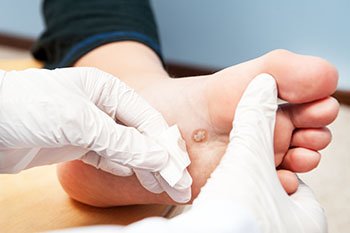
Plantar warts are small, rough growths that appear on the soles of the feet, caused by the human papillomavirus, known as HPV. These warts are contagious and can spread through direct contact or by walking barefoot in public places like swimming pools and locker rooms. People with weakened immune systems, such as those with diabetes, HIV, or undergoing chemotherapy, are more likely to develop plantar warts. The virus thrives in warm, moist environments, making feet particularly vulnerable. Plantar warts can be painful, especially when pressure is applied while walking, and may appear with tiny black dots at their center, which are blood vessels. While treatments like salicylic acid can help, they often take time and may not work for deeper or larger warts. A podiatrist can offer a proper diagnosis and suggest effective treatment for plantar warts. Treatment options include cryotherapy, laser therapy, or minor surgical removal for faster, more lasting results. If you have a plantar warts, it is suggested that you schedule an appointment with a podiatrist.
Plantar warts can be very uncomfortable. If you need your feet checked, contact one of our podiatrists from Arcadia Foot and Ankle. Our doctors will assist you with all of your foot and ankle needs.
About Plantar Warts
Plantar warts are the result of HPV, or human papillomavirus, getting into open wounds on the feet. They are mostly found on the heels or balls of the feet.
While plantar warts are generally harmless, those experiencing excessive pain or those suffering from diabetes or a compromised immune system require immediate medical care. Plantar warts are easily diagnosed, usually through scraping off a bit of rough skin or by getting a biopsy.
Symptoms
- Lesions on the bottom of your feet, usually rough and grainy
- Hard or thick callused spots
- Wart seeds, which are small clotted blood vessels that look like little black spots
- Pain, discomfort, or tenderness of your feet when walking or standing
Treatment
- Freezing
- Electric tool removal
- Laser Treatment
- Topical Creams (prescription only)
- Over-the-counter medications
To help prevent developing plantar warts, avoid walking barefoot over abrasive surfaces that can cause cuts or wounds for HPV to get into. Avoiding direct contact with other warts, as well as not picking or rubbing existing warts, can help prevent the further spread of plantar warts. However, if you think you have developed plantar warts, speak to your podiatrist. He or she can diagnose the warts on your feet and recommend the appropriate treatment options.
If you have any questions please feel free to contact our offices located in Scottsdale, North Scottsdale, Mesa, and Sun City, AZ . We offer the newest diagnostic and treatment technologies for all your foot and ankle needs.